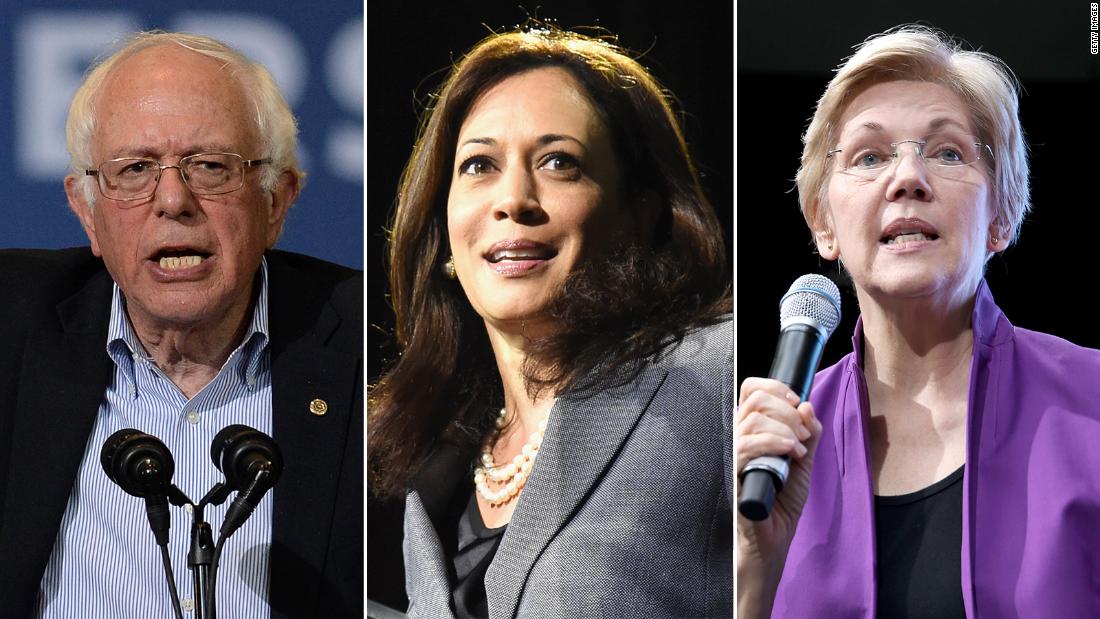
But the poll also reveals strengths and weaknesses for those two and several other Democratic contenders.
For Biden, it's mostly a positive picture. The new poll shows him with 81% favorability among likely Democratic caucusgoers. He has the highest support out of 20 possible Democratic candidates -- 27% picked him as their first choice. But there's a big gap between 27% and 81%. Among other candidates, that very good favorability rating (of which Biden's is exceptionally high), could mean a higher number who would support him in the primary. There are a number of reasons this could be, including that Biden hasn't actually declared a run for president yet.
But there's other good news for the former Vice President in the poll -- 64% of the likely Democratic caucusgoers said that Biden has more experience than any other candidate and want him to get in the race. Only three-in-ten said that the time for him as a candidate has passed and he should stay out.
Biden's political views are "about right" for most caucusgoers (70%), with fewer who thought he was too liberal (6%) or too conservative (14%). However, Biden was the first choice for those who identify as moderate or conservative Democrats, but not among those who said they were liberal, who picked Sanders as their first choice.
Things are generally positive for the Senator from Vermont, as well, though he lags behind Biden in a few key respects, and Democratic caucusgoers have their own concerns about him. He has a very high favorability rating (71% saw him in a positive light) relatively similar to the December Iowa poll. He's the first choice for 25% of likely caucusers, up from 19% in December of last year.
But likely caucusgoers are split on whether the Democratic socialist's views are too liberal (44%) or about right (48%), something that could hurt him in the long run as Democrats face a question about what direction their party is headed in.
And unlike Biden, his numbers were more evenly split on whether he should get into the race. A majority (54%) said that his candidacy pushed the party in a good direction last time and he should run, but 43% said the time for him as a candidate has passed and he shouldn't be running -- higher than those who said Biden should stay out of the race (31%).
Sen. Elizabeth Warren
Warren had 9% of likely caucus attendees who said she was their first choice for the Democratic nominee. While significantly lower than Biden or Sanders, she has a relatively strong favorability rating, too. Almost two-thirds have a positive view of the Massachusetts senator, lower than the other two leading candidates.
But while Sanders is still performing well enough among both liberals and moderates, Warren's favorability rating takes a hit among moderate Democrats. Sanders and Warren have similar favorable ratings among liberals (76% and 74% respectively), but among moderates Sanders gets 68% favorability while Warren drops to 54%.
Almost a quarter of likely Iowa caucusers said Warren's political views are "too liberal," while 54% thought she's "about right," second only to field-leader Biden on this measure.
Sen. Kamala Harris
Next in the lineup, 7% said Harris was their first choice for the Democratic nominee. Her favorability ratings have increased significantly since the December poll, most likely due to more people knowing who she is after her campaign announcement in late January. Fifty-eight percent of likely Democratic caucusgoes had a favorable opinion of the senator, up from 49% in the last poll.
Harris doesn't have a ton of obvious weaknesses in the poll except that while her favorabilities are growing, her election numbers have stayed relatively stable. Almost half said her political views are "about right" and 12% said she's "too liberal."
Former US Rep. Beto O'Rourke
Finally, the poll shows a cooling around O'Rourke. Five percent of likely Iowa caucusgoers said he was their first choice for the Democratic nominee and 6% for second choice. Combined, he is the first or second choice of 11%, down from 23% who said so in December. Since December was right after he had lost his Texas Senate election, he seemed to have been prominent in a lot of people's minds, an intensity that has since decreased.
His favorable rating has remained stable (52% now, 53% in December), but again, the excitement for O'Rourke is lagging. While in December, 28% said they had a very favorable opinion of him, that has gone down to 19% now.
Other Democrats who have been making the news weren't very high up in being chosen as a first choice for the vote, such as Sen. Cory Booker (3% who said he was their first choice), Sen. Amy Klobuchar (3%), and Sen. Kirsten Gillibrand (0%).
The CNN/Des Moines Register/Mediacom poll was conducted by Selzer & Co. March 3 through 6, 2019 among a random sample of 401 likely Democratic caucusgoers reached on landlines or cellphones by a live interviewer. Results for the sample of likely caucusgoers have a margin of sampling error of plus or minus 4.9 percentage points, it is larger for subgroups.
Bagikan Berita Ini















0 Response to "CNN Poll: The strengths and the weaknesses of the Democrats in Iowa"
Post a Comment